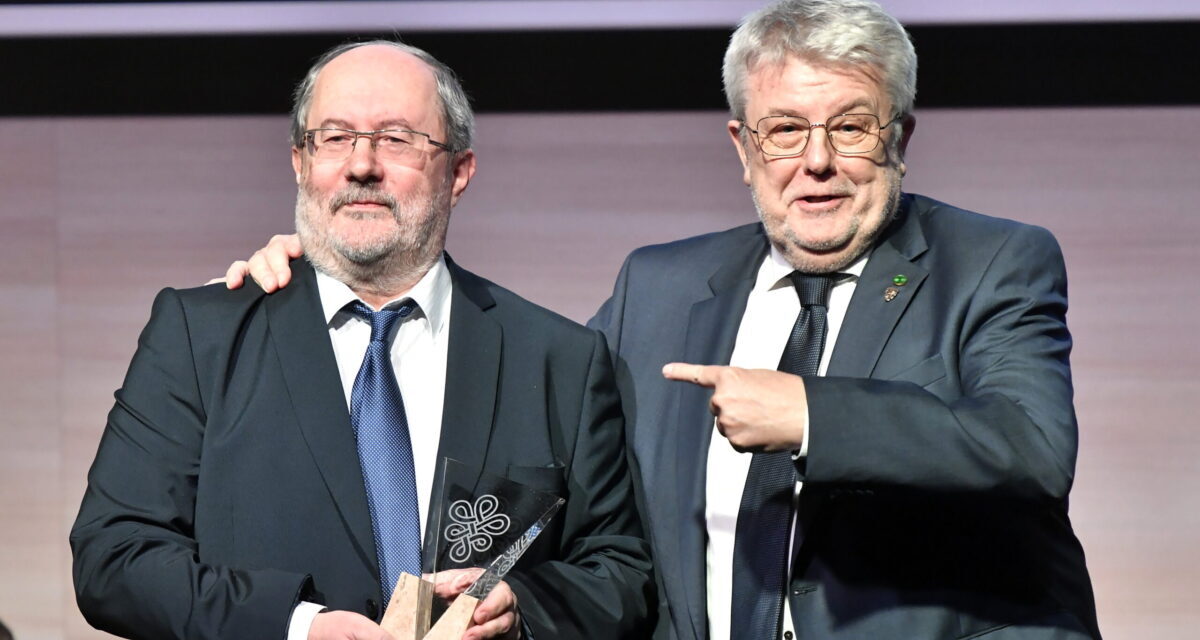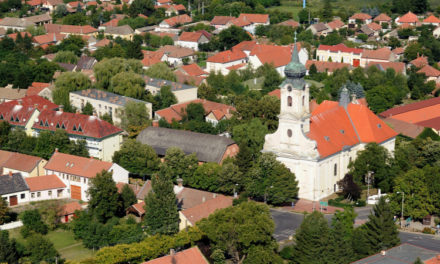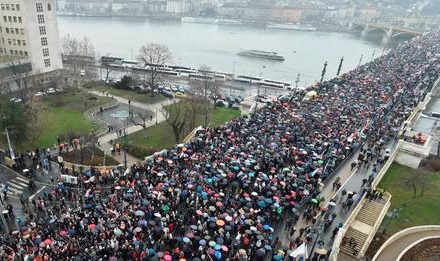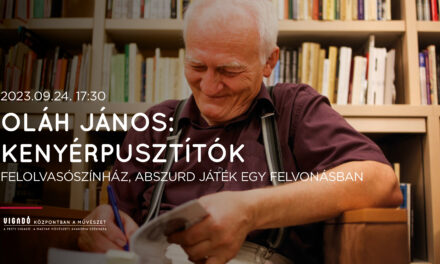Political scientist Tamás Fricz, curator of CÖF-CÖKA, received one of CÖF-CÖKA's 2022 Intellectual Patriot Awards at the ceremony held on January 19. Tamás Fricz's eulogy was delivered by Attila Miklós Németh, which is presented below.
Anyone who says they don't know who they are is either not telling the truth, or completely ignorant of the political and social life of their country. Tamás Fricz is a political scientist, co-founder of CÖF-CÖKA, member of the NGO's board of trustees, a dedicated fighter for Christian-conservative ideas, and an expert evaluator of Hungarian and international political struggles. Attila Miklós Németh praised and summarized the work of the political scientist who was awarded the Spiritual Defender Award.
"I have always been of the opinion that the Hungarian regime change had a "birth defect", namely that our parliamentary democracy was created without civil society foundations. The democratic state was created as a result of the peaceful, negotiated – and sometimes negotiated – transition, but there was a lack of "zoonpoliticons", politicizing citizens who check the power of the day and speak out, actively participate in public life when needed." This opinion was formulated by Tamás Fricz for the volume presenting the decade and a half of the Civil Solidarity Forum. As the founder of CÖF, the author believes that "the essence of democracy is a strong civil society" and that is why the Civil Solidarity Forum had to be created, he adds.
Tamás Fricz is a political scientist, philosopher, economist, candidate of political science and the most civilized citizen. It is civil in its thinking, in its manifestations, in the formation of opinions, in its present and future vision of society, but it is also civil in its appearance. /…. / He is like someone who got up from his computer at the time he was writing a series of intelligible instructions to voters who he thought had been neglected, or he was debating with those who responded to what he had said in his blog, or he was proofreading his latest book.
It can't be so cold that your unbuttoned coat doesn't flutter with the vigor of the young people of March, you arrive in the suddenly popular jacket underneath, with a scarf wrapped around your neck, or rather, you ride to the event. for performance, studio recording.
…. Who does not know about our country that it is "a country without consequences", or it was. Because the electoral defeat of the civilian government in 2002 formulated this with the publicist, who then, during the eight-year left-liberal country leadership, or rather the process of losing the country, first turned this phrase into the slogan "perhaps not a country without consequences" and then "consequences nonetheless" a country without" - was shaped by gá. Let's not forget that in this narrow decade the bourgeois circles were formed, Medgyessy was overthrown by his sports minister, we entered the European Union, and the post-communists won the election by deceiving the country's population and misleading the European Union. Gyurcsány said this, but admitting the lie didn't make him resign either. He didn't give in to the demands of the hundreds of thousands protesting on Kossuth Square for months. He clung to the steering wheel like a drowning man unable to swim to a deflated rubber mattress. In those days, Tamás Fricz still hoped that the persistent "Pest guys" would demand an early election! He even dreamed that the symbolic date, the 50th anniversary of the revolution and freedom struggle of 1956, would offer this never-to-be-returned opportunity. He did offer, but instead blood flowed again on the streets of Pest.
In the first days of the new year, Tamás Fricz summarized the lessons learned from the police officer in 2006 in the Magyar Nemzet: "Three decades of the Kádár era got people used to the fact that politics and politicking are not their business, something distant and alien to them, they cannot shape , to influence, thus it is better to stay away from it. Cadarism therefore created a gap between politics, the political elite and society, society became not a civil society, but a private society, which could not exert any influence on the state or big politics."
So far the quote. The basic problem was not necessarily insurmountable: freedom could be won, democratization and citizenship could be achieved even without civil society. However, finalizing and perpetuating this is an almost impossible undertaking from above, since the state is capable of many things, but cannot solve everything. Citizenship and civil society can only be created authentically and permanently by building from the bottom up. In the second year of the left-liberal government, our author states that the first decade and a half of the regime change made it clear that there is no "state" civil society - or, if it does, it is unstable and easily collapses.
The first turning point in the direction of the creation of a national civil society was brought about by the 2002 election campaign, or more precisely the first round of the election - recalls Tamás Fricz in the book Together Together. A few days before the second round - the author continues - a crowd of hundreds of thousands or millions gathered at Kossuth Square to show their faith in the government led by Viktor Orbán. The electoral defeat still occurred, but based on the voter activity between the two rounds, after the elections, Viktor Orbán announced the so-called "citizen circles" movement, according to which voters with national sentiments formed small circles in every part of the country. These circles mushroomed in the period between 2002 and 2006, and they played a major role in creating the foundations of civic activity and citizenship.
In fact, it is from this date that Tamás Fricz became the Spiritual Defender of the Fatherland. The publicisms of the actually scientific researcher are becoming more and more popular, but above all they are unavoidable for the opposition and pro-government press, but his own interests also called him more and more often into the community of a Civic Circle. He confesses this: "I became convinced that I must personally help the Hungarian national civil society in building a Christian-based civic self-awareness, and after the unexpected defeat in 2002, I tried to keep people's spirits up with my modest means." The experiences he gained there convince him that the Hungarian electorate is capable of making his own, independent decision, as long as he receives meaningful information about the political processes and the universal interests of the country and the nation. The voter must be respected. To inform, so that he is able to act meaningfully and make responsible decisions in an informed manner.
Tamás Fricz has continuously advocated early elections since the electoral defeat of the civil forces in 2002, which he saw as a barrier in the patched party-state constitution temporarily negotiated at the National Round Table. He continuously fought for the fact that, if the discredited left-liberal government is overthrown, then the parliament formed as a result of the early elections should be transformed into a constitutional national assembly and a basic law confirmed by the people be drafted, which also includes the direct election of the President of the Republic. Let the moderately weak head of state become a moderately strong head of state, who is able to handle political crises by virtue of the law. Tamás Fricz's sincere civility is also shown in the fact that he continues to stand by this vision, although there is no party or coalition of parties in power or fighting for power that has or would do so together. It didn't even happen. Quote from a 2004 article by Tamás Fricz:
"...Sports Minister Gyurcsány went so far as to announce that the Constitutional Court is now also pro-Fidesz, as it dared to throw back the hospital law. Well, dear Sports Minister Gyurcsány, after this - strictly based on your own logic - boldly say: today the European Union is also pro-Fidesz, since several of their leaders protested against the lex Szász. "Nah! What is that?!" (Very much so! – I add for the sake of completeness)
The impossible situation, that the usurpers of power are not willing to resign, and that the opposition civilian forces do not seem to be hastening the takeover of power, was difficult not only for the crowd of hundreds of thousands of protesters in Kossuth Square, but also for the analyst himself. In the 24 hours before the economic crisis of 2008, he simply called Hungary's political and social system "neocadarism", a formal multi-party system, and an informal one-man rule, to which the opposition helplessly assists. Some hope glimmered in our author's eyes when the opposition representatives, led by Viktor Orbán, started dismantling the cordon that fenced off the protesters in the square in front of the Parliament. Tamás Fricz assessed this as perhaps finally breaking bread between the opposition forces and those in government. In their actions, our author also believed to discover the possibility of the development of civil society:
"Hungary needs civil society to finally take ownership of democracy!" - he made it clear and in 2008 he started a stronger civil political activity, after he felt that civil public life could not tolerate the existing conditions. In this spirit, with the help of Budakalás civilians, he started the national signature collection, the purpose of which was to force the left-liberal government to leave.
"If we don't solve the current crisis by implementing bold, brave and far-reaching ideas, if we continue to use the usual Hungarian mutt, brother-in-law and brother-in-law solutions that have been known for centuries (such as the terrible idea of the grand coalition), then let's lower our heads, step aside, and not dare to complain about anything anymore."
In other words, nothing about us, without us!
Tamás Fricz, political scientist, economist, candidate of political science, started his career as an economist, and then became a high-level practitioner of political science, a teacher for a decade and a half - from Pécs to Budapest, Eger to Miskolc -, editor and editorial board member of Hungarian and foreign journals.
He is the author of 17 volumes and books and has published more than 150 studies in Hungarian, English, German and Polish. He regularly publishes articles in daily newspapers and is a regular participant in analysis programs in the media. Since 2013, he has been a senior scientific associate at the Institute and Archive for Research on the History of Regime Change (RETÖRKI), and since 2022 he has been a senior scientific advisor. From 2019, he is a research consultant for the Center for Fundamental Rights. In 2005, the Hungarian Media Workshop awarded him the European Medal.
In 2012, together with five of his colleagues who organized the Peace Marches, he was awarded the Award of the Association for Civil Hungary. In 2013, he received the civilian section of the Hungarian Order of Merit.
Tamás Fricz is therefore not only an excellent scientist, publicist and unavoidable public figure, i.e. CIVIL with a capital letter, but as of today he is also an officially distinguished Spiritual Defender!
Attila Miklós Németh
Cover photo: MTI/Péter Lakatos












